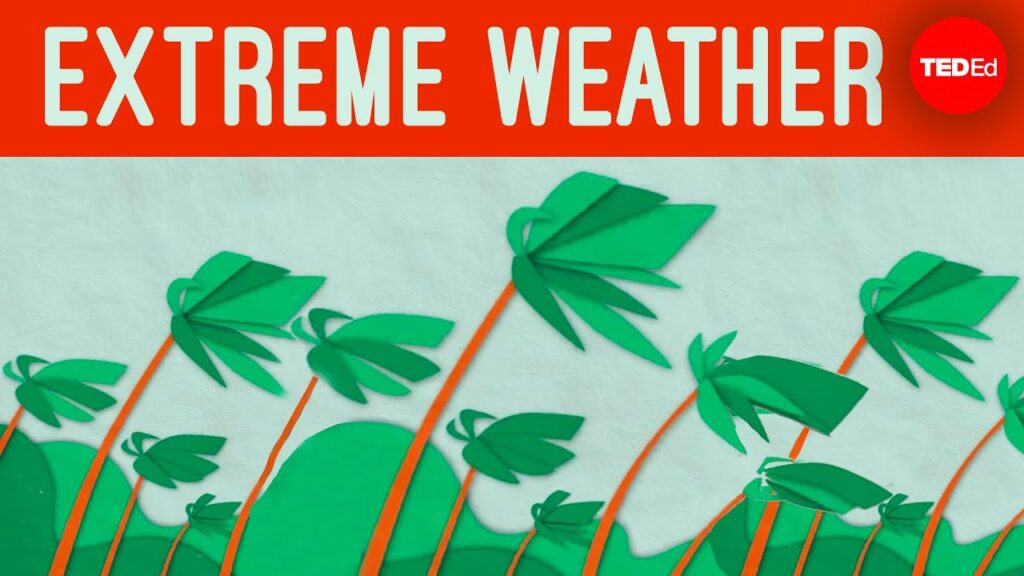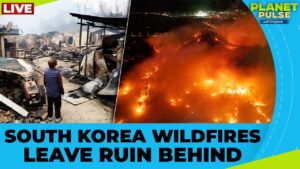
Explore the differences between weather and climate – what they are, how we predict them, and what those predictions can tell us.
—
From 2016 to 2019, the world saw record-breaking heat waves, rampant wildfires, and the longest run of category 5 tropical cyclones on record. The number of extreme weather events has been increasing for the last 40 years, and current predictions suggest that trend will continue. So, is the increase in extreme weather due to random chance, or changing climate? R. Saravanan investigates.
Lesson by R. Saravanan, directed by Hype CG.
Animator’s website: https://www.hype.cg/ and https://www.luisacopetti.com/
Educator’s website: https://r.saravanan.us/
Sign up for our newsletter: http://bit.ly/TEDEdNewsletter
Support us on Patreon: http://bit.ly/TEDEdPatreon
Follow us on Facebook: http://bit.ly/TEDEdFacebook
Find us on Twitter: http://bit.ly/TEDEdTwitter
Peep us on Instagram: http://bit.ly/TEDEdInstagram
View full lesson: https://ed.ted.com/lessons/is-the-weather-becoming-more-extreme-r-saravanan
Thank you so much to our patrons for your support! Without you this video would not be possible! Shafeeq Ansari, Gabriel Balsa, Maryam Sultan, Bethany Connor, Jeremy Shimanek, Adam Foreman, Sebastiaan Vleugels, Lâm Nguyễn, Mark Byers, Bradley Heinold, Monkeypatcher, Laurence McMillan, Connor Roberts, Dmitry Neverov, Tonya Ratliff-Garrison, Avinash Amarnath, Eric McDaniel, Cristian Cristian, France Lipužič, EdoKun, Rare Media, Rayo, Faizan, Elizabeth Gu, Nazmul Idris, Po Foon Kwong, Siobhan O’Connor Gwozdz, NinjaBoffin, Jesse Jurman, Josue Perez Miranda, Jan-Erik, Scott Markley, Kaitlyn holland, Elija Peterson, Michele Lynn Rose, Jai Prasanth, Vack91, David Lucsanyi, Xavier dupont, Marisa Miller, Boytsov Ilya, Steven Razey, Javier Aldavaz, Nathan Giusti, Mada Arslan, Joichiro Yamada, Ritul Raghavan, Aline de Paula Zillig, Yambu Ganesh Shaw and Abeer Rajbeen.
source




Global warming has nothing to do with auto exhaust or emissions. There has been a substantial rise in seismic and volcanic activity over the last hundred years especially in the oceans. This has increased the temperature of the land, the sea, and the air. The earth's climate is most likely changing back to what it was 2,000 years ago when it was much warmer. When the Romans were in Britain (40BC-380AD) they grew citrus fruit in the north.
The answer is in the first sentence
typically mankind has been terrible at limitation… but we have always been good at innovation, let's just hope we are good enough to save ourselves, I still have hope…
So the sun and the earth heating itself controls the climate but man also does?? It’s strange that he says there is “Near” universal agreement on man made climate change but those that don’t agree who are eminent scientists themselves their voices go unheard and are drowned out… why?
It's certainly true that severe weather has increased in the last 40 years, but what about before that, and why?
Well, the earth cooled from the 40s until the late 70s, and experienced less severe weather than the first half of the century, which warmed from 1900 to the 40s; the peak of this warming reached above what we have so far seen in our warming cycle.
This cooling stopped in the late 70s and began to reverse, in a new 40 year trend that has seen rising a return to warm weather conditions.
As for the severity of these disasters, so far, the early half of the twentieth century takes the cake far and above what we have yet seen. The most damaging natural disaster in US history, the Great Galveston Storm; 1900.
Paris Flooded in 1910, which lasted two months. Pittsburg was also flooded in 1907, which caused an estimated $5 million in damages. 1910 also saw the single largest wildfire in US history, the Big Blow Up, which consumed swathes of Idaho, Montana, and Washington. The worst storm of the Great Lakes region, the White Hurricane, struck in 1913. In the same year, Ohio was hit by a statewide flood in it's worst natural disaster, leaving tens of thousands homelessness in the aftermath. The Knickerbocker Storm- the worst snow storm in US history, arguably- hit in 1922, leaving DC in nearly two and a half feet of snow. The deadliest tornado in US history- the Great Tri-State Tornado- hit in 1925, and had gusts of up to 300 miles per hour.The most devastating flood in US history was in 1927- the Great Mississippi Flood, and left nearly a million people in an area covering seven states without homes. London had it's own terrible flood a year later, and in 1931, the Central China Flood struck. The countries deadliest flood, and one of the worlds worst disasters, is thought to have killed nearly 4 million people, and affected a region larger than England. In 1934, Japan experienced one of it's worst typhoons which landed at Cape Muroto. Of course, the Dustbowl period goes without saying, and is highlighted by the worst dust storm of the era in 1935, which affected Kansas, Colorado, Texas, Oklahoma, and New Mexico.
I skipped quite a lot, and of course disaster continued even after the cooling began, particularly snow related events, but you get the point I'm sure. Things have been getting worse for the recent past, but we have had worse as recent as a century ago.
umm, boundary condition… hmmm… as a mechanical engineering student, the way this video introduces the term and uses it throughout seems kinda off tbh 🙁
carry out an experiment of 11 air fillled glass chambers with thermocouples in and datalogged to a pc to record the air temperature every minute for 24 hours. first chamber should contain 0.00% co2, the second 0.01% co2, the third 0.02% co2, the fourth 0.03% co, the fith 0.04% co2, the sixth 0.05% co2, the seventh 0.06% co2, the eighth 0.07% co2, the nineth 0.08% co2, the tenth 0.09% co2and the 11th 0.10% co2. all equidistant from a heat source while their contents temperatures are recorded every minute
if there is a corelation in data, then we can conclude that co2 does infact influence air temperature and all high school students from around the world can carry out the experiment to confirm the case for co2 without arguments. otherwise all those locked up in prisons around the world on corruption, fraud and theft charges should be released back into society.
Haarp!
Wow how did the animals millions of years just survive 20 C higher global temperatures, according to this researchers they must have been in hurricanes all the time.
This is what the weather must've been like on Venus right before the sun killed its atmosphere.
We must change our ways of thinking.
When survival will not matter, what we should do is focus on making life better for those alive now.
The lesson humans never will learn or accept
More often than before, lightning has been escaping the atmosphere.
cool
Fart vid
Why Do We Have to Have Natural Disasters?
We receive major blows from nature ultimately in order to shake us out of the state where we live according to an egoistic paradigm—with exploitation, manipulation and hatred dwelling in our connections—to a state where we positively connect, as described by the words, “as one man with one heart,” i.e., as a single well-oiled interconnected and interdependent system.
In other words, if we shared a harmonious and balanced connection to each other on the human level, then the balance at our level would ripple throughout nature and we would experience nature harmoniously and peacefully, and natural disasters, as we call them, would become a thing of the past.
We would be wise to pay attention to the future states that we can achieve out of such blows: that the blows come to shake us out of our current dreamlike state in our egoistic attitudes to each other, and wake us up into an opposite harmonious and peaceful world.
In fact, we live in a world that is all good, and only we human beings give the world a negative form in our egoistic attitudes to each other. The time is nearing when we will awaken to the need to stop relating to each other through egoistic lenses—where we each prioritize self-benefit at others’ expense—and instead relate patiently to each other with positive, kind and caring attitudes.
If we made such a switch, we would bear witness to a good life, the likes of which we have never before experienced. We should thus try to reach such relations as quickly as possible.
Goodddddddddddddddddddddddddddddddddddddddddddddddddddddddddddddddddddddddddddddddddddddddddddddddddddddddddddddddddddddddddddddddddddddddddddddddddddddddddddddddddddddddddddddddddddddddddddddddddddddddddddddddddddddddddddddddddddddddddddddddddddddddddddddddddddddddddddddddddddddddddddddddddddddddddddddddddddddddddddddddddddddddddddddddddddddddddddddddddddddddddddddddddddddddddddddddddddddddddddddddddddddddddddddddddddddddddddddddddddddddddddddddddddddddddddddddddddddddddddddddddddddddddddddddddddddddddddddddddddddddddddddddddddddddddddddddddddddddddddddddddddddddddddddddddddddddddddddddddddddddddddddddddddddddddddddddddddddddddddddddddddddddddddddddddddddddddddddddddddddddddddddddddddddddddddddddddddddddddddddddddddddddddddddddddddddddddddddddddddddddddddddddddddddddddddddddddddddddddddddddddddddddddddddddddddddddddddddddddddddddddddddddddddddddddddddddddddddddddddddddddddddddddddddddddddddddddddddddddddddddddddddddddddddddddddddddddddddddddddddddddddddddddddddddddddddddddddfddddddddddddddddddddddddddddddddddddddddddddddddddddddddddddddddddddddddddddddddddddddddddddddddddddddddddddddddddddddddddddddddddddddddddddddddddddddddddddddddddddddddddddddddddddddddddddddddddddddddddddddddddddddddddddddddddddddddddddddddddddddddddddddddddddddddddddddddddddddddddddddddddddddddddddddddddddddddddddddddddddddddddddddddddddddddddddddddddddddddddddddddddddddddddddddddddddddddddddddddddddddddddddddddddddddddddddddddddddddddddddddddddddddddddddddddddddddddddddddddddddddddddddddddddddddddddddddddddddddddddddddddddddddddddddddddddddddddddddddddddddddddddddddddddddddddddddddddddddddddddddddddddddddddddddddddddddddddddddddddddddddddddddddddddddddddddddddddddddddddddddddddddddddddddddddddddddddddddddddddddddddddddddddddddddddddddddddddddddddddddddddddddddddddddddddddddddddddddddddddddddddddddddddddddddddddddddddddddddddddddddddddddddddddddddddddddddddddddddddddddddddddddddddddddddddddddddddddddddddddddddddddddddddddddddddddddddddddddddddddddddddddddddddddddddddddddddddddddddddddddddddddddddddddddddddddddddddddddddddddddddddddddddddddddddddddddddddddddddddddddddddddddddddddddddddddddddddddddddddddddddddddddddddddddddddddddddddddddddddddddddddddddddddddddddddddddddddddddddddddddddddddddddddddddddddddddddddddddddddddddddddddddddddddddddddddddddddddddddddddddddddddddddddddddddddddddddddddddddddddddddddddddddddddddddddddddddddddddddddddddddddddddddddddddddddddddddddddddddddddddddddddddddddddddddddddddddddddddddddddddddddddddddddddddddddddddddddddddddddddddddddddddddddddddddddddddddddddddddddddddddddddddddddddddddddddddddddddddddddddddddddddddddddddddddddddddddddddddddddddddddddddddddddddddddddddddddddddddbddddddddddddddddddddddddddddddddddddddddddddddddddddddddddddddddddddddddddddddddddddddddddddddddddddddddddddddddddddddddddddddddddddddddddddddddddddddddddddddddddddddddddddddddddddddddddddddddddddddddddddddddddddddddddddddddddddddddddddddddddddddddddddddddddddddddddddddddddddddddddddddddddddd
Short answer: No.
Long answer: According to the weather data, no.
According to damage calculated in lives lost: no.
According to damage calculated in dollars: yes.
It’s simple: there are more people and infrastructure in the world so damage calculated in reference to devastation of capital would be expected to be greater. It is greater for things that cannot move. However, loss of life due to extreme weather is down something like 99% in the last century and still declining. Recovery is faster and resilience to extreme weather increases with wealth and access to cheap energy.
3:53
What caused the storm that caused the Night of the Big Wind in Ireland in 1839?
wondering about the balloon released twice a day? will it not caused another environmental issues?
We r all gonna die
I feel so much joy when I'm researching a topic on science and ted-ed pops up as the first video
One word HARP